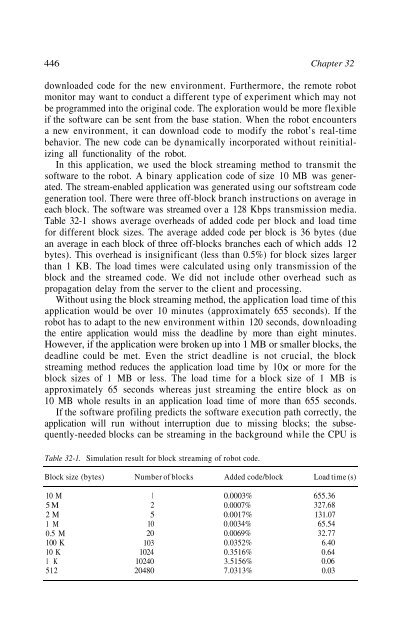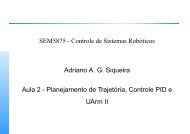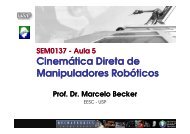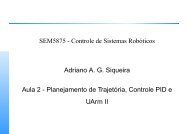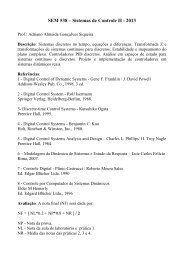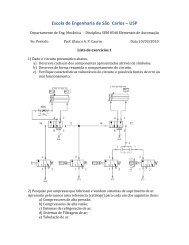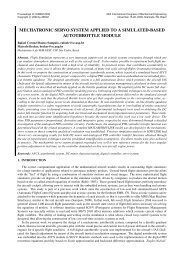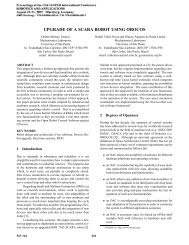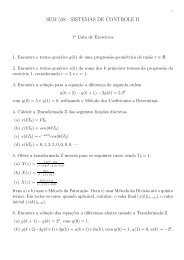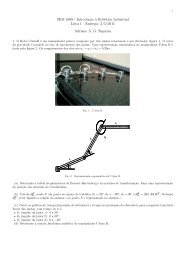- Page 2 and 3:
EMBEDDED SOFTWARE FOR SoC
- Page 4 and 5:
Embedded Software for SoC Edited by
- Page 6 and 7:
DEDICATION This book is dedicated t
- Page 8 and 9:
TABLE OF CONTENTS Dedication Conten
- Page 10 and 11:
Table of Conents Chapter 16 EMBEDDE
- Page 12 and 13:
Table of Conents Chapter 33 ADAPTIV
- Page 14 and 15:
PREFACE The evolution of electronic
- Page 16 and 17:
INTRODUCTION Embedded software is b
- Page 18 and 19:
Introduction xvii software consists
- Page 20 and 21:
Introduction xix Energy-aware techn
- Page 22 and 23:
PART I: EMBEDDED OPERATING SYSTEMS
- Page 24 and 25:
Chapter 1 APPLICATION MAPPING TO A
- Page 26 and 27:
Application Mapping to a Hardware P
- Page 28 and 29:
Application Mapping to a Hardware P
- Page 30 and 31:
Application Mapping to a Hardware P
- Page 32 and 33:
Chapter 2 FORMAL METHODS FOR INTEGR
- Page 34 and 35:
Formal Methods for Integration of A
- Page 36 and 37:
Formal Methods for Integration of A
- Page 38 and 39:
Formal Methods for Integration of A
- Page 40 and 41:
Formal Methods for Integration of A
- Page 42 and 43:
Formal Methods for Integration of A
- Page 44 and 45:
Formal Methods for Integration of A
- Page 46 and 47:
Chapter 3 LIGHTWEIGHT IMPLEMENTATIO
- Page 48 and 49:
Lightweight Implementation of the P
- Page 50 and 51:
Lightweight Implementation of the P
- Page 52 and 53:
Lightweight Implementation of the P
- Page 54 and 55:
Lightweight Implementation of the P
- Page 56 and 57:
Lightweight Implementation of the P
- Page 58 and 59:
Lightweight Implementation of the P
- Page 60 and 61:
Chapter 4 DETECTING SOFT ERRORS BY
- Page 62 and 63:
Detecting Soft Errors by a Purely S
- Page 64 and 65:
Detecting Soft Errors by a Purely S
- Page 66 and 67:
Detecting Soft Errors by a Purely S
- Page 68 and 69:
Detecting Soft Errors by a Purely S
- Page 70 and 71:
Detecting Soft Errors by a Purely S
- Page 72 and 73:
Detecting Soft Errors by a Purely S
- Page 74 and 75:
PART II: OPERATING SYSTEM ABSTRACTI
- Page 76 and 77:
Chapter 5 RTOS MODELING FOR SYSTEM
- Page 78 and 79:
RTOS Modeling for System Level Desi
- Page 80 and 81:
RTOS Modeling for System Level Desi
- Page 82 and 83:
RTOS Modeling for System Level Desi
- Page 84 and 85:
RTOS Modeling for System Level Desi
- Page 86 and 87:
RTOS Modeling for System Level Desi
- Page 88 and 89:
RTOS Modeling for System Level Desi
- Page 90 and 91:
Chapter 6 MODELING AND INTEGRATION
- Page 92 and 93:
Modeling and Integration of Periphe
- Page 94 and 95:
Modeling and Integration of Periphe
- Page 96 and 97:
Modeling and Integration of Periphe
- Page 98 and 99:
Modeling and Integration of Periphe
- Page 100 and 101:
Modeling and Integration of Periphe
- Page 102 and 103:
Modeling and Integration of Periphe
- Page 104 and 105:
Chapter 7 SYSTEMATIC EMBEDDED SOFTW
- Page 106 and 107:
Systematic Embedded Software Genera
- Page 108 and 109:
Systematic Embedded Software Genera
- Page 110 and 111:
Systematic Embedded Software Genera
- Page 112 and 113:
Systematic Embedded Software Genera
- Page 114 and 115:
Systematic Embedded Software Genera
- Page 116 and 117:
PART III: EMBEDDED SOFTWARE DESIGN
- Page 118 and 119:
Chapter 8 EXPLORING SW PERFORMANCE
- Page 120 and 121:
Exploring SW Performance 99 of late
- Page 122 and 123:
Exploring SW Performance 101 operat
- Page 124 and 125:
Exploring SW Performance 103 The ch
- Page 126 and 127:
Exploring SW Performance 105 2.2. T
- Page 128 and 129:
Exploring SW Performance 107 Figure
- Page 130 and 131:
Exploring SW Performance 109 modem
- Page 132 and 133:
Chapter 9 A FLEXIBLE OBJECT-ORIENTE
- Page 134 and 135:
A Flexible Object-Oriented Software
- Page 136 and 137:
A Flexible Object-Oriented Software
- Page 138 and 139:
A Flexible Object-Oriented Software
- Page 140 and 141:
A Flexible Object-Oriented Software
- Page 142 and 143:
A Flexible Object-Oriented Software
- Page 144 and 145:
A Flexible Object-Oriented Software
- Page 146 and 147:
Chapter 10 SCHEDULING AND TIMING AN
- Page 148 and 149:
Analysis of HW/SW On-Chip Communica
- Page 150 and 151:
Analysis of HW/SW On-Chip Communica
- Page 152 and 153:
Analysis of HW/SW On-Chip Communica
- Page 154 and 155:
Analysis of HW/SW On-Chip Communica
- Page 156 and 157:
Analysis of HW/SW On-Chip Communica
- Page 158 and 159:
Chapter 11 EVALUATION OF APPLYING S
- Page 160 and 161:
Evaluation of Applying SpecC to the
- Page 162 and 163:
Evaluation of Applying SpecC to the
- Page 164 and 165:
Evaluation of Applying SpecC to the
- Page 166 and 167:
Evaluation of Applying SpecC to the
- Page 168 and 169:
Evaluation of Applying SpecC to the
- Page 170 and 171:
Evaluation of Applying SpecC to the
- Page 172 and 173:
Chapter 12 INTERACTIVE RAY TRACING
- Page 174 and 175:
Interactive Ray Tracing on Reconfig
- Page 176 and 177:
Interactive Ray Tracing on Reconfig
- Page 178 and 179:
Interactive Ray Tracing on Reconfig
- Page 180 and 181:
Interactive Ray Tracing on Reconfig
- Page 182 and 183:
Interactive Ray Tracing on Reconfig
- Page 184 and 185:
Interactive Ray Tracing on Reconfig
- Page 186 and 187:
Chapter 13 PORTING A NETWORK CRYPTO
- Page 188 and 189:
Porting a Network Cryptographic Ser
- Page 190 and 191:
Porting a Network Cryptographic Ser
- Page 192 and 193:
Porting a Network Cryptographic Ser
- Page 194 and 195:
Porting a Network Cryptographic Ser
- Page 196 and 197:
Porting a Network Cryptographic Ser
- Page 198 and 199:
PART IV: EMBEDDED OPERATING SYSTEMS
- Page 200 and 201:
Chapter 14 INTRODUCTION TO HARDWARE
- Page 202 and 203:
Introduction to Hardware Abstractio
- Page 204 and 205:
Introduction to Hardware Abstractio
- Page 206 and 207:
Introduction to Hardware Abstractio
- Page 208 and 209:
Chapter 15 HARDWARE/SOFTWARE PARTIT
- Page 210 and 211:
Hardware and Software Partitioning
- Page 212 and 213:
Hardware and Software Partitioning
- Page 214 and 215:
Hardware and Software Partitioning
- Page 216 and 217:
Hardware and Software Partitioning
- Page 218 and 219:
Hardware and Software Partitioning
- Page 220 and 221:
Hardware and Software Partitioning
- Page 222 and 223:
Hardware and Software Partitioning
- Page 224 and 225:
Hardware and Software Partitioning
- Page 226 and 227:
Hardware and Software Partitioning
- Page 228 and 229:
Chapter 16 EMBEDDED SW IN DIGITAL A
- Page 230 and 231:
Embedded SW in Digital AM-FM Chipse
- Page 232 and 233:
Embedded SW in Digital AM-FM Chipse
- Page 234 and 235:
PART V: SOFTWARE OPTIMISATION FOR E
- Page 236 and 237:
Chapter 17 CONTROL FLOW DRIVEN SPLI
- Page 238 and 239:
Control Flow Driven Splitting of Lo
- Page 240 and 241:
Control Flow Driven Splitting of Lo
- Page 242 and 243:
Control Flow Driven Splitting of Lo
- Page 244 and 245:
Control Flow Driven Splitting of Lo
- Page 246 and 247:
Control Flow Driven Splitting of Lo
- Page 248 and 249:
Control Flow Driven Splitting of Lo
- Page 250 and 251:
Control Flow Driven Splitting of Lo
- Page 252 and 253:
Chapter 18 DATA SPACE ORIENTED SCHE
- Page 254 and 255:
Data Space Oriented Scheduling 233
- Page 256 and 257:
Data Space Oriented Scheduling 235
- Page 258 and 259:
Data Space Oriented Scheduling 237
- Page 260 and 261:
Data Space Oriented Scheduling 239
- Page 262 and 263:
Data Space Oriented Scheduling 241
- Page 264 and 265:
Data Space Oriented Scheduling 243
- Page 266 and 267:
Chapter 19 COMPILER-DIRECTED ILP EX
- Page 268 and 269:
Compiler-Directed ILP Extraction 24
- Page 270 and 271:
Compiler-Directed ILP Extraction 24
- Page 272 and 273:
Compiler-Directed ILP Extraction 25
- Page 274 and 275:
Compiler-Directed ILP Extraction 25
- Page 276 and 277:
Compiler-Directed ILP Extraction 25
- Page 278 and 279:
Compiler-Directed ILP Extraction 25
- Page 280 and 281:
Compiler-Directed ILP Extraction 25
- Page 282 and 283:
Chapter 20 STATE SPACE COMPRESSION
- Page 284 and 285:
State Space Compression in History
- Page 286 and 287:
State Space Compression in History
- Page 288 and 289:
State Space Compression in History
- Page 290 and 291:
State Space Compression in History
- Page 292 and 293:
State Space Compression in History
- Page 294 and 295:
State Space Compression in History
- Page 296 and 297:
Chapter 21 SIMULATION TRACE VERIFIC
- Page 298 and 299:
Simulation Trace Verification for Q
- Page 300 and 301:
Simulation Trace Verification for Q
- Page 302 and 303:
Simulation Trace Verification for Q
- Page 304 and 305:
Simulation Trace Verification for Q
- Page 306 and 307:
Simulation Trace Verification for Q
- Page 308 and 309:
PART VI: ENERGY AWARE SOFTWARE TECH
- Page 310 and 311:
Chapter 22 EFFICIENT POWER/PERFORMA
- Page 312 and 313:
Efficient Power/Performance Analysi
- Page 314 and 315:
Efficient Power/Performance Analysi
- Page 316 and 317:
Efficient Power/Performance Analysi
- Page 318 and 319:
Efficient Power/Performance Analysi
- Page 320 and 321:
Efficient Power/Performance Analysi
- Page 322 and 323:
Efficient Power/Performance Analysi
- Page 324 and 325:
Efficient Power/Performance Analysi
- Page 326 and 327:
Chapter 23 DYNAMIC PARALLELIZATION
- Page 328 and 329:
Dynamic Parallelization of Array 30
- Page 330 and 331:
Dynamic Parallelization of Array 30
- Page 332 and 333:
Dynamic Parallelization of Array 31
- Page 334 and 335:
Dynamic Parallelization of Array 31
- Page 336 and 337:
Dynamic Parallelization of Array 31
- Page 338 and 339:
Dynamic Parallelization of Array 31
- Page 340 and 341:
Chapter 24 SDRAM-ENERGY-AWARE MEMOR
- Page 342 and 343:
SDRAM-Energy-Aware Memory Allocatio
- Page 344 and 345:
SDRAM-Energy-Aware Memory Allocatio
- Page 346 and 347:
SDRAM-Energy-Aware Memory Allocatio
- Page 348 and 349:
SDRAM-Energy-Aware Memory Allocatio
- Page 350 and 351:
SDRAM-Energy-Aware Memory Allocatio
- Page 352 and 353:
PART VII: SAFE AUTOMOTIVE SOFTWARE
- Page 354 and 355:
Chapter 25 SAFE AUTOMOTIVE SOFTWARE
- Page 356 and 357:
Safe Automotive Software Developmen
- Page 358 and 359:
Safe Automotive Software Developmen
- Page 360 and 361:
Safe Automotive Software Developmen
- Page 362 and 363:
Safe Automotive Software Developmen
- Page 364 and 365:
PART VIII: EMBEDDED SYSTEM ARCHITEC
- Page 366 and 367:
Chapter 26 EXPLORING HIGH BANDWIDTH
- Page 368 and 369:
Exploring High Bandwidth Pipelined
- Page 370 and 371:
Exploring High Bandwidth Pipelined
- Page 372 and 373:
Exploring High Bandwidth Pipelined
- Page 374 and 375:
Exploring High Bandwidth Pipelined
- Page 376 and 377:
Exploring High Bandwidth Pipelined
- Page 378 and 379:
Exploring High Bandwidth Pipelined
- Page 380 and 381:
Chapter 27 ENHANCING SPEEDUP IN NET
- Page 382 and 383:
Enhancing Speedup in Network Proces
- Page 384 and 385:
Enhancing Speedup in Network Proces
- Page 386 and 387:
Enhancing Speedup in Network Proces
- Page 388 and 389:
Enhancing Speedup in Network Proces
- Page 390 and 391:
Enhancing Speedup in Network Proces
- Page 392 and 393:
Enhancing Speedup in Network Proces
- Page 394 and 395:
Chapter 28 ON-CHIP STOCHASTIC COMMU
- Page 396 and 397:
On-Chip Stochastic Communication 37
- Page 398 and 399:
On-Chip Stochastic Communication 37
- Page 400 and 401:
On-Chip Stochastic Communication 37
- Page 402 and 403:
On-Chip Stochastic Communication 38
- Page 404 and 405:
On-Chip Stochastic Communication 38
- Page 406 and 407:
On-Chip Stochastic Communication 38
- Page 408 and 409:
Chapter 29 HARDWARE/SOFTWARE TECHNI
- Page 410 and 411:
HW/SW are Techniques for Improving
- Page 412 and 413:
HW/SW are Techniques for Improving
- Page 414 and 415:
HW/SW are Techniques for Improving
- Page 416 and 417: HW/SW are Techniques for Improving
- Page 418 and 419: HW/SW are Techniques for Improving
- Page 420 and 421: HW/SW are Techniques for Improving
- Page 422 and 423: HW/SW are Techniques for Improving
- Page 424 and 425: Chapter 30 RAPID CONFIGURATION & IN
- Page 426 and 427: Rapid Configuration & Instruction S
- Page 428 and 429: Rapid Configuration & Instruction S
- Page 430 and 431: Rapid Configuration & Instruction S
- Page 432 and 433: Rapid Configuration & Instruction S
- Page 434 and 435: Rapid Configuration & Instruction S
- Page 436 and 437: Rapid Configuration & Instruction S
- Page 438 and 439: Rapid Configuration & Instruction S
- Page 440 and 441: PART IX: TRANSFORMATIONS FOR REAL-T
- Page 442 and 443: Chapter 31 GENERALIZED DATA TRANSFO
- Page 444 and 445: Generalized Data Transformations 42
- Page 446 and 447: Generalized Data Transformations 42
- Page 448 and 449: Generalized Data Transformations 42
- Page 450 and 451: Generalized Data Transformations 42
- Page 452 and 453: Generalized Data Transformations 43
- Page 454 and 455: Generalized Data Transformations 43
- Page 456 and 457: Chapter 32 SOFTWARE STREAMING VIA B
- Page 458 and 459: Software Streaming Via Block Stream
- Page 460 and 461: Software Streaming Via Block Stream
- Page 462 and 463: Software Streaming Via Block Stream
- Page 464 and 465: Software Streaming Via Block Stream
- Page 468 and 469: Software Streaming Via Block Stream
- Page 470 and 471: Chapter 33 ADAPTIVE CHECKPOINTING W
- Page 472 and 473: Adaptive Checkpointing with Dynamic
- Page 474 and 475: Adaptive Checkpointing with Dynamic
- Page 476 and 477: Adaptive Checkpointing with Dynamic
- Page 478 and 479: Adaptive Checkpointing with Dynamic
- Page 480 and 481: Adaptive Checkpointing with Dynamic
- Page 482 and 483: Adaptive Checkpointing with Dynamic
- Page 484 and 485: Adaptive Checkpointing with Dynamic
- Page 486 and 487: PART X: LO POWER SOFTWARE
- Page 488 and 489: Chapter 34 SOFTWARE ARCHITECTURAL T
- Page 490 and 491: Software Architectural Transformati
- Page 492 and 493: Software Architectural Transformati
- Page 494 and 495: Software Architectural Transformati
- Page 496 and 497: Software Architectural Transformati
- Page 498 and 499: Software Architectural Transformati
- Page 500 and 501: Software Architectural Transformati
- Page 502 and 503: Software Architectural Transformati
- Page 504 and 505: Software Architectural Transformati
- Page 506 and 507: Chapter 35 DYNAMIC FUNCTIONAL UNIT
- Page 508 and 509: Dynamic Functional Unit Assignment
- Page 510 and 511: Dynamic Functional Unit Assignment
- Page 512 and 513: Dynamic Functional Unit Assignment
- Page 514 and 515: Dynamic Functional Unit Assignment
- Page 516 and 517:
Dynamic Functional Unit Assignment
- Page 518 and 519:
Dynamic Functional Unit Assignment
- Page 520 and 521:
Chapter 36 ENERGY-AWARE PARAMETER P
- Page 522 and 523:
Energy-Aware Parameter Passing 501
- Page 524 and 525:
Energy-Aware Parameter Passing 503
- Page 526 and 527:
Energy-Aware Parameter Passing 505
- Page 528 and 529:
Energy-Aware Parameter Passing 507
- Page 530 and 531:
Energy-Aware Parameter Passing 509
- Page 532 and 533:
Energy-Aware Parameter Passing 511
- Page 534 and 535:
Chapter 37 LOW ENERGY ASSOCIATIVE D
- Page 536 and 537:
Low Energy Associative Data Caches
- Page 538 and 539:
Low Energy Associative Data Caches
- Page 540 and 541:
Low Energy Associative Data Caches
- Page 542 and 543:
Low Energy Associative Data Caches
- Page 544 and 545:
Low Energy Associative Data Caches
- Page 546 and 547:
Low Energy Associative Data Caches
- Page 548 and 549:
INDEX abstract communication access
- Page 550 and 551:
Index 529 packet flows parameter pa


